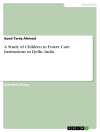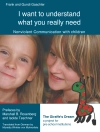Mary Renck Jalongo Interpersonal relationships present an interesting paradox to the young child. Although human bonds are a source of love, security and joy, they are, at the same time, the context in which children feel intense and complicated emotions such as jealousy, shame, resentment, sorrow, and rage. To illustrate, consider a series of incidents in the life of a young child named Melissa. All of these events were so memorable that they became oft-repeated family stories. At age 4, after Melissa was reprimanded by her mother, she packed a small plastic suitcase and announced that she was running away. Her mother kept a watchful eye while the preschooler stood at the end of the driveway for several moments. The child’s sister—eight years her senior—decided to go out and gently inquire about her younger sibling’s plans, to which Melissa responded ruefully, “I can’t run away. I remembered that I’m not allowed to cross the street by myself. ” Months later, Melissa enters kindergarten and she arrives home at the end of her school day, obviously upset. When asked about it, she says, “One of the kids told me I was doing my work wrong and it ruined my whole day. ” In first grade, Melissa has experience with one of the school child’s greatest fears: a mean teacher.
Inhoudsopgave
Foundations of Interpersonal Relationships.- The Young Child and Social Relationships in Developing Countries.- Parental and Educator Perspectives on Young Children’s Acquisition of Self-Regulatory Skills.- Early Language Development and Adult/Child Relationships.- Family Ties.- Challenging the Stereotypes of Mexican American Fathers.- Brothers and Sisters.- How Attention to Family Stress Dynamics can Prevent Homelessness Among Very Young Families.- Fostering Emergent Literacy through Parent/Child Reading Relationships.- Grandparents in the Lives of Young Children.- Relationships in Child Care and School Settings.- Building Positive Relationships in the Lives of Infants and Toddlers in Child Care.- Fostering Relationships Between Infants, Toddlers and Their Primary Caregivers in Child Care Centres in Australia.- Working With Recently Immigrated Young Children.- Young Children’s Perceptions of School Administrators.
Over de auteur
Mary Renck Jalongo is a teacher, writer and editor. As a classroom teacher, she taught preschool, first grade and second grade, worked with children and families of migrant farm workers, and taught in the laboratory preschool at the University of Toledo. Currently she is a professor at Indiana University of Pennsylvania where she earned the university-wide award for outstanding teaching and is the Coordinator of the Doctoral Program in Curriculum and Instruction. As a writer, Dr. Jalongo has authored and edited more than 25 books, many of them textbooks in the field of early childhood education, such as Early Childhood Language Arts (4th ed. Allyn & Bacon) and Creative Thinking and Arts-Based Learning (4th ed. Merrill/Prentice Hall), Exploring Your Role: An Introduction to Early Childhood Education (3rd ed., Merrill/Prentice Hall) and Major Trends and Issues in Early Childhood Education: Challenges, Controversies, and Insights (2nd ed. Teachers College Press). Recent publications include the second edition of a book for the National Association for the Education of Young Children, Young Children and Picture Books; a Teachers College Press book, Planning for Learning: Collaborative Approaches to Lesson Design and Review; and an edited book for the Association for Childhood Education International, The World’s Children and Their Companion Animals: Developmental and Educational Significance of the Child/Pet Bond. Additionally, she has earned three national awards for excellence in writing and numerous teaching awards. Dr. Jalongo has been the editor-in-chief of the Springer international publication, Early Childhood Education Journal, for twelve years.












